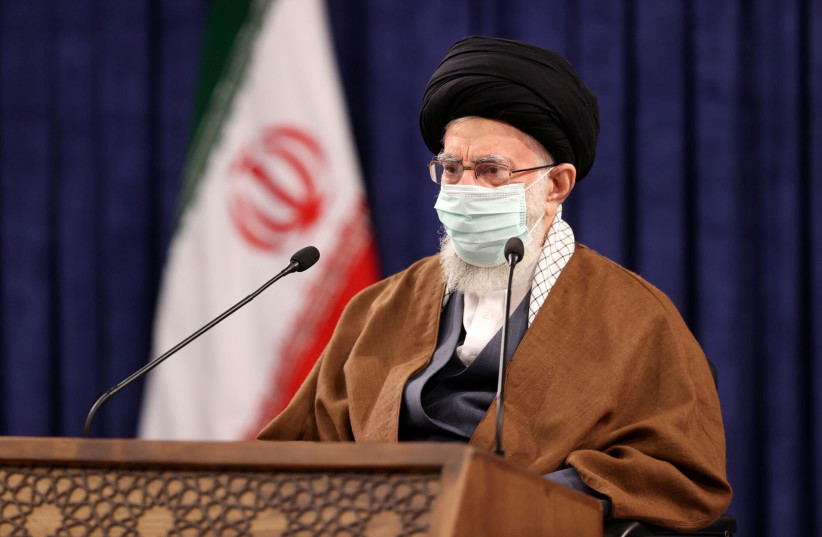Prime Minister Yair Lapid and US President Joe Biden spoke on the phone on Wednesday, for the first time since a new draft of the Iran nuclear deal was tabled, and as the negotiations’ coordinator said an agreement could be days away.
The leaders spoke for an hour about the talks and stopping Iran’s progress toward a nuclear weapon.
Lapid also praised strikes Biden ordered in Syria, in the context of acting against Iran’s regional aggression.
Biden “emphasized his deep commitment to the security of the State of Israel and to preserving Israel’s capability to deter its enemies and to defend itself by itself against any threat,” according to the Prime Minister’s Office.
They also discussed advancing relations between the US and Israel.

A senior Israeli official said that Lapid’s “feeling in the call was that we are being listened to. [The president] said definitively that, agreement or not, Israel is entitled to defend itself without any limitations.”
In addition, the official said Lapid’s impression was that Biden will not allow any compromises on matters that are not in the deal, such as International Atomic Energy Agency probes or the Islamic Revolutionary Guard Corps’ designation as a terrorist organization, nor will the US allow any guarantees circumventing the agreement.
What is Lapid asking for?

Lapid called for a credible American military threat to Iran earlier this week.
World powers “have to get Iran to sign a much better agreement, what the Americans themselves called ‘longer and stronger,’” Lapid said. “Such an agreement can only be reached with a credible military threat, so the Iranians see they will have to pay a heavy price for their recalcitrance.”
EU High Representative for Foreign Affairs Josep Borrell, the Iran talks’ coordinator, said on Wednesday that he thought a deal could be reached within days.
“It’s more than three weeks [since] I shared a draft text as coordinator to the partners in order to conclude the Vienna talks,” Borrell said in a press conference in Brussels. “I got feedbacks from all delegations. I got comments from Iran and the US, which both I found reasonable.”
Borrell said the sides found “common ground,” and the agreement takes everyone’s concerns into account.
“I am hoping that in the coming days, we are not going to lose this momentum and we can close the deal,” he stated.
White House National Security Spokesman John Kirby said a deal is “closer now than we had been in certain recent weeks and months, due in large part to Iran being willing to drop some of their demands that were not related to the deal at all.”
“We’re cautiously optimistic that things can continue to move in the right direction,” Kirby stated.
What has Iran been saying?
Iranian Foreign Minister Hossein Amir-Abdollahian, however, said his country is seeking “to obtain stronger guarantees” that the US will not leave the deal again, as it did in 2018, and that businesses will work with Iran once sanctions are lifted.
Of the ongoing International Atomic Energy Agency investigation into traces of uranium found at undeclared sites in Iran, Amir-Abdollahian said, “We want to reinforce in the text the idea that the [IAEA] concentrates on its technical task and moves away from its political role.”
Iranian President Ebrahim Raisi said on Monday that the nuclear deal could not be revived unless the IAEA closes its probes. The US and E3 – Britain, France and Germany – say Iran must provide credible answers to the nuclear watchdog.
The IAEA reported that Iran began enriching uranium with the second of three cascades, or clusters, of advanced IR-6 centrifuges recently installed at an underground plant at Natanz, according to a report seen by Reuters.
Like the first of those three cascades of up to 174 machines each, the second is enriching uranium to up to 5% fissile purity and the third has not been fed with nuclear material, the confidential report to member states said. A separate report on Monday said the first cascade had been brought on-stream.
Amir-Abdollahian made his remarks during a visit to Moscow, soon after Iranian drones were delivered to Russia, and amid growing concerns in Washington that Russia would use the Iran deal to circumvent Western sanctions.
The EU draft of the Iran deal would have the US lift sanctions in exchange for the Islamic Republic drastically reducing its uranium enrichment and production of centrifuges. The agreement would maintain the 2015 deal’s “sunset clauses,” by which the restrictions on Iran’s nuclear program would expire gradually, starting in 2024 and ending in 2030.
Biden promised to return to the deal in his 2020 election campaign, and his administration entered talks to do so in April 2021.
Lapid argued on Sunday that the draft is not what Biden said he was seeking when he visited Israel.
“The deal should not let $100 billion flow to Iran per year without them showing restraint in response,” a senior diplomatic source said. “It needs to be a deal that will continue forever to prevent them from getting a nuclear weapon.”
“The deal should not let $100 billion flow to Iran per year without them showing restraint in response. It needs to be a deal that will continue forever to prevent them from getting a nuclear weapon.”
Senior diplomatic source
Another concern Israel has brought up with the US and other allies is that Iran is enriching and stockpiling more uranium than anyone knows, the source said.
“It’s clear that they’ve been lying to the IAEA,” the source stated. “We have shown that to the world more than once.”
Reuters contributed to this report.
